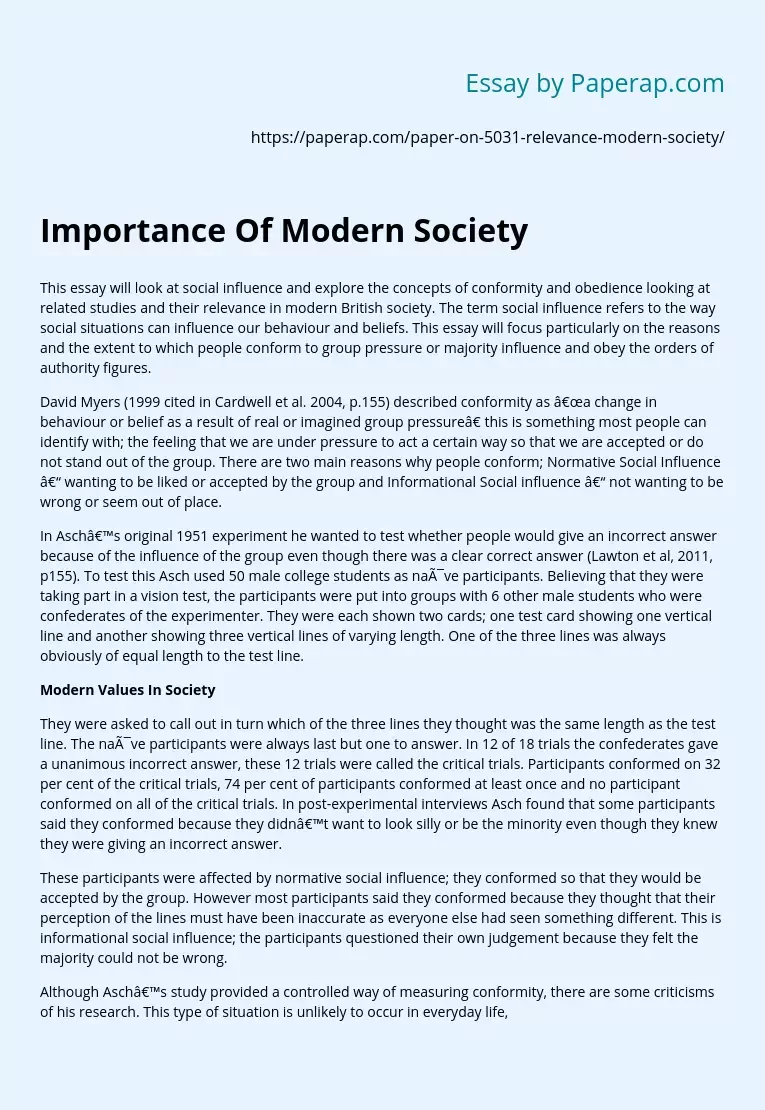Importance Of Modern Society
This essay will look at social influence and explore the concepts of conformity and obedience looking at related studies and their relevance in modern British society. The term social influence refers to the way social situations can influence our behaviour and beliefs. This essay will focus particularly on the reasons and the extent to which people conform to group pressure or majority influence and obey the orders of authority figures.
David Myers (1999 cited in Cardwell et al. 2004, p.155) described conformity as “a change in behaviour or belief as a result of real or imagined group pressure” this is something most people can identify with; the feeling that we are under pressure to act a certain way so that we are accepted or do not stand out of the group.
There are two main reasons why people conform; Normative Social Influence – wanting to be liked or accepted by the group and Informational Social influence – not wanting to be wrong or seem out of place.
In Asch’s original 1951 experiment he wanted to test whether people would give an incorrect answer because of the influence of the group even though there was a clear correct answer (Lawton et al, 2011, p155). To test this Asch used 50 male college students as naïve participants. Believing that they were taking part in a vision test, the participants were put into groups with 6 other male students who were confederates of the experimenter. They were each shown two cards; one test card showing one vertical line and another showing three vertical lines of varying length.
One of the three lines was always obviously of equal length to the test line.
Modern Values In Society
They were asked to call out in turn which of the three lines they thought was the same length as the test line. The naïve participants were always last but one to answer. In 12 of 18 trials the confederates gave a unanimous incorrect answer, these 12 trials were called the critical trials. Participants conformed on 32 per cent of the critical trials, 74 per cent of participants conformed at least once and no participant conformed on all of the critical trials. In post-experimental interviews Asch found that some participants said they conformed because they didn’t want to look silly or be the minority even though they knew they were giving an incorrect answer.
These participants were affected by normative social influence; they conformed so that they would be accepted by the group. However most participants said they conformed because they thought that their perception of the lines must have been inaccurate as everyone else had seen something different. This is informational social influence; the participants questioned their own judgement because they felt the majority could not be wrong.
Although Asch’s study provided a controlled way of measuring conformity, there are some criticisms of his research. This type of situation is unlikely to occur in everyday life, showing the experiment lacks ecological validity. Another criticism is Asch’s limited sample of participants. Not only does this sample not represent cultural differences; non-Western cultures like Japan and China are generally more likely to conform than Western cultures like the USA (Gross and Rolls, 2003). But also, a group of all male college students may be more or less likely to conform because they are among their peers. As people in the USA in the 1950s were more conformist and conservative than our current more liberal and individualist society, Asch’s research has little relevance to modern day British society.
Zimbardo et al (1971) conducted an experiment that aimed to investigate how readily people would conform to social roles and whether brutality of prison officers was due to the individual’s personal characteristics or the prison environment (Simply Psychology [online]). Zimbardo et al (1971) selected healthy, emotionally stable, male volunteers to take part in a two week experiment. The volunteers were randomly assigned roles of prisoner or guard. Prisoners were then arrested by local police, blindfolded and taken to a mock prison in the basement of Stanford University where they were issued with prison uniform and a prison number. The guards wore military-style uniforms with reflective sunglasses and carried a truncheon and handcuffs.
The experiment was abandoned after just six days as the guards conformed so enthusiastically to their role, becoming aggressive and abusive towards the prisoners. After guards tackled an initial rebellion two days into the study the prisoners because submissive and began to develop signs of depression and anxiety. Some prisoners showed such severe symptoms that they were released from the experiment early.
Importance Of Modern Society. (2019, Dec 05). Retrieved from https://paperap.com/paper-on-5031-relevance-modern-society/

